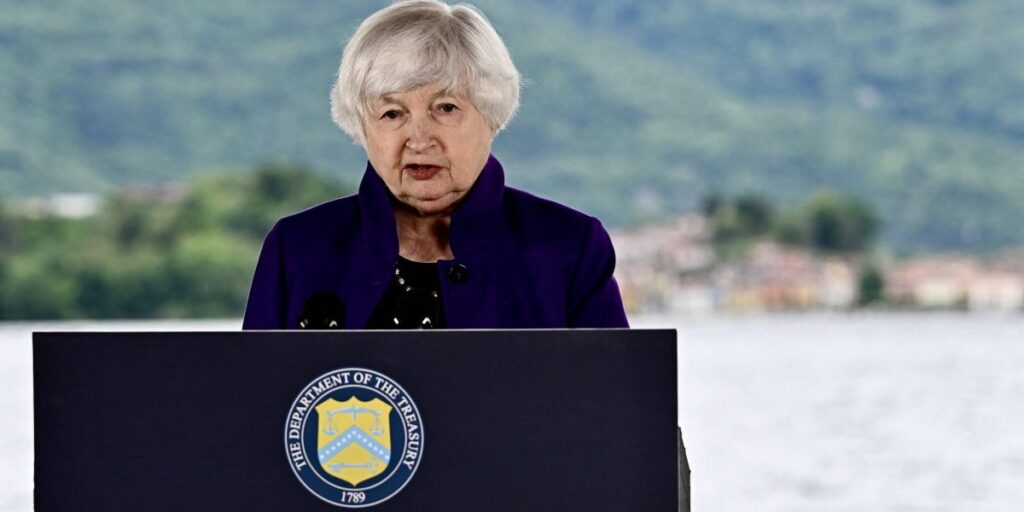
Treasury Secretary Janet Yellen said the prospect of higher long-term interest rates makes it more difficult to curb U.S. borrowing needs, underscoring the importance of raising revenue in negotiations with Republican lawmakers.
“We raised our interest rate forecast,” Yellen said in an interview with Bloomberg News on Friday. “That does have an impact. It makes it more challenging to control the deficit and interest payments.
Yellen was referring to the Biden administration’s budget proposal, which she said ensures the country remains on a sustainable fiscal track. She reiterated her emphasis on a metric that highlights inflation-adjusted interest payments compared to gross domestic product. The rate has increased over the past year, but the White House expects it to stabilize at around 1.3% over the next decade.
“I don’t have a hard and fast rule, but I don’t want to see it go above 2%,” she said in her most specific comments on the guidance. She has previously said the government’s forecasts produced “historically normal” debt costs.
By comparison, economists at Goldman Sachs Group Inc. do think the ratio is outside the tolerance range, projecting net real interest payments to reach 2.3% by 2034. Five years ago, the bank’s forecast was 1.5%.
Soaring interest rates are a key reason for the worsening outlook. The Federal Reserve will raise interest rates sharply starting in 2022 to combat inflation, making it more expensive for the government to repay debt.
In its latest annual budget proposal, the White House projected a 10-year Treasury yield of 3.7% in the early 2030s, almost a full percentage point higher than the 2.8% it proposed three years ago. Treasury bill rates, which closely track the Fed’s benchmark rate, have risen about half a percentage point in these long-term forecasts.
“We included a number of deficit reduction measures in the budget to keep interest payments at a level that we believe is fiscally responsible,” Yellen said. She was speaking at a meeting of G7 finance ministers and central bank governors in Theresa, Italy. Interviewed by Bloomberg News on the sidelines.
“We’re going to start tax negotiations,” Yellen said, referring to the looming fight over tax cut legislation passed by former President Trump in 2017, which is set to expire at the end of 2025.
While Trump has promised to extend the cuts, President Joe Biden wants to keep them in place only for people making less than $400,000 a year. As for the revenue from the unextended tax cuts, Yellen said in the interview that “some of it may need to be used” to reduce the deficit.
Yellen said it was “also necessary” to pay for the extended reserves with new revenue. One way to help finance that would be to implement a global corporate minimum tax agreement, she said. “You need to do more than that, but it comes at a cost.” On Saturday, she said the United States was not ready to sign the final version of the deal.
Biden’s March budget also included tax increases on capital gains and households worth at least $100 million, as well as a series of revenue-raising proposals that Republicans opposed.
Furman’s doubts
Yellen noted that “if we go back to a zero-interest-rate world and believe that is a long-term sustainable situation,” the path for federal net interest costs will be even lower.
Over time, her view of where borrowing costs will be resolved appears to have shifted. Last October, she said it was “entirely possible that we will see lower long-term yields” because many of the underlying trends that depressed yields in the past “remain in place.”
While many observers focus on the overall debt-to-GDP ratio, a 2020 paper by Harvard’s Jason Furman and Lawrence Summers argued that policymakers should Focus on preventing real net interest from rising above 2% of GDP. Summers is a former Treasury secretary and a paid contributor to Bloomberg Television.
Furman, the former White House chief economist under the Obama administration, said last year that the 2% guideline was not sacrosanct.
“This is based on the experience of other countries, the historical experience of the United States and our intuition,” Furman said in an interview last May. “I’m not sure that’s right.”

